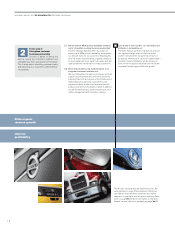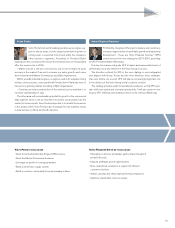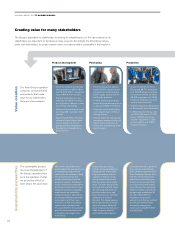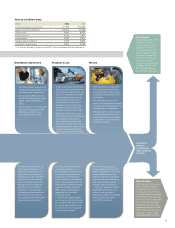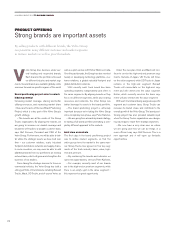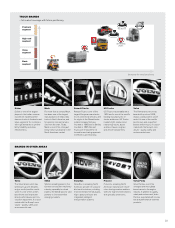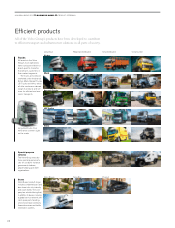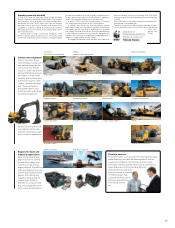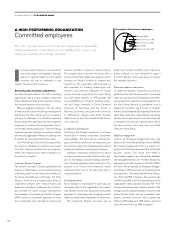Volvo 2012 Annual Report Download - page 24
Download and view the complete annual report
Please find page 24 of the 2012 Volvo annual report below. You can navigate through the pages in the report by either clicking on the pages listed below, or by using the keyword search tool below to find specific information within the annual report.
Creating value for many stakeholders
Value creation
The Group is dependent on stakeholders to develop its competitiveness, in the same manner as its
stakeholders are dependent on the Group in many respects. Accordingly, the Volvo Group strives,
jointly with stakeholders, to create common values in a manner that is sustainable in the long-term.
The Volvo Group’s operation
comprises several activities
and products that create
value for our stakeholders.
Here are a few examples.
A GLOBAL GROUP 2012 BUSINESS MODEL
Product development Purchasing Production
• The Volvo Group has approxi-
mately 36,000 subcontractors
in the first tier, of which about
6,000 supply components for
the Group’s products.
• In 2012, the Group made pur-
chases of goods and services in
an amount of SEK 211.5 billion.
• Corporate social responsibility
is an integrated part of the pur-
chasing process.
• One job within the Volvo Group
generates a number of other job
opportunities directly at sub-
contractors and indirectly in the
rest of society.
• At year-end 2012, the Volvo
Group had 98,717 employees
and 16,548 temporary employ-
ees and consultants, of whom
48,152 employees and 7,548
temporary employees and con-
sultants were blue collar.
• The Volvo Group has 61 factories
in 18 countries around the world.
• In 2012, the Volvo Group deliv-
ered 224,000 trucks, 10,700
buses, 78,500 units of con-
struction equipment, 17,200
marine engines and 17,600
industrial engines.
Sustainability perspective
The sustainability perspec-
tive is an integrated part of
the Group’s operation. Here
are a few examples of what
we do and the effects of
each step in the value chain.
We work to reduce the environ-
mental impact of our products and
on developing energy efficient
solutions for our customers. Each
new product must have less
environ mental impact than the
product it replaces. The Group
works continuously to improve the
performance of products and our
long-term research and develop-
ment focuses on sustainable
transport solutions, with a focus
on transport efficiency, lower fuel
consumption and thus lower
emissions, as well as on hybrid
solutions and alternative fuels.
This is profitable for the customer,
good for the environment and a
competitive advantage for the
Volvo Group.
Responsible purchasing
involves encouraging behavior,
managing risks and building
long-term relations with our
suppliers to improve social,
environmental and business
ethical relations in the supply
chain. The Volvo Group strives
to ensure that unethical values
are not incorporated into our
products and services and
bases the work on a minimum
standard in its Code of
Conduct. The Group believes
that a high standard of corpo-
rate social responsibility will
result in high productivity and
stable long-term relations,
which will benefit all parties.
Environmental work is governed
by a common environmental
policy. Another important tool is
Volvo Production System, with
methods for streamlining the
operation and minimizing pro-
ductivity losses and also tools
for documenting work-related
risks, indicators for measuring
health and safety and methods
for ergonomic workplaces. At
the end of 2012, 97% of
employees in production
worked in units that are certified
according to environmental
and quality management
systems, primarily ISO 14001
and ISO 9001.
• Costs for research and develop-
ment amounted to SEK 14.8 bil-
lion (13.3) for 2012, correspond-
ing to 4.9% (4.4) of net sales.
• Product development is con-
trolled by the needs of custom-
ers, legislation, changes in soci-
ety and new technology.
• Safety and environmental issues
are integrated in product devel-
opment.
• Approximately 90% of the envi-
ronmental impact from a truck
occurs during use. Conse-
quently, product development
focuses on sustainable trans-
port solutions.
20






